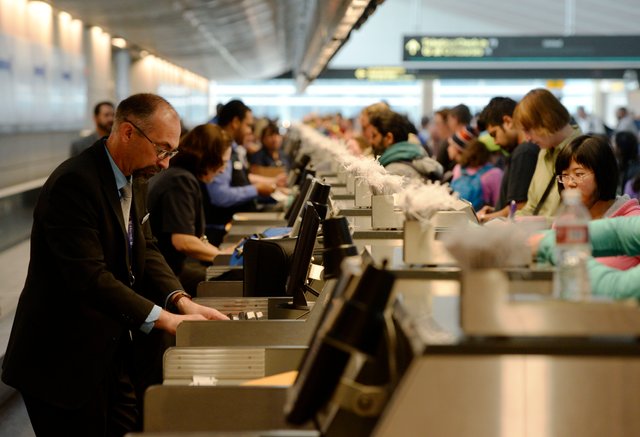The end of the paper ticket
As rising aviation fuel prices have caused an impressive crisis in the aviation industry, top airlines around the world gathered in Istanbul over the weekend to mark an even more positive milestone: the end of aircraft paperwork. At a time when planes are raising rates or setting charges for everything from excess baggage to seat selection, eliminating paper tickets will reduce airlines' costs by up to $ 3 billion worldwide and reduce ticketing costs by $ 10. for $ 10. $ 1, according to Bryan Wilson of the International Air Transport Association (IATA).

"If you have a paper ticket, it's time to donate it to the museum," said Giovanni Bisignani, CEO and IATA CEO, before the association's annual meeting. As of June 1, IATA will no longer deliver paper tickets to 60,000 travel agents in 125 countries around the world.
Many American travellers may think that paper tickets are gone because most American airlines stopped issuing paper tickets for domestic flights a few years ago. But in other parts of the world, and especially on international routes involving more airlines, paper tickets are more common, and since the first electronic ticket was issued in 1994, it has been 13 years before stocks of paper tickets issued by IATA were removed. When IATA started operating electronic tickets in 2004, only 18% of tickets issued by IATA airlines worldwide were electronic.
However, accepting electronic tickets is not easy to sell. In 1990, when I was commissioned by United Airlines to help create a product that would allow consumers to book a trip online, none of the airline management believed that paper tickets could be lost. "People need the security of a paper ticket," they insisted, although I saw that passengers did not need a paper voucher to rent a car or hotel room. Several years before the advent of the Internet, consumers began shopping through proprietary online systems such as CompuServe and Prodigy. Although these early online systems were not based on today's standards, travel booking looked like a natural online application. But it was also immediately clear that paper tickets were a major barrier to online acceptance and an expensive offer for timely delivery.
At the time, most tickets were sent to U.S. Pat. Post, purchased at the city ticket office, through a travel agent or at the airport. The unpredictable delivery time required to deliver a ticket by post limits the use of the self-service booking tool, especially for business travellers who prefer a last-minute purchase and a change of route. We have explored several ways to sell tickets for United Airlines' first online consumer booking product, from overnight delivery to set up a special airport pick-up desk to book tickets online, but each method seems cumbersome, potentially expensive and often unreliable, especially for everyone. . who are trying. travel less than a week after booking.
It's been a while, and it's compelling, but as airlines realize they can save money by eliminating paperwork and consumer acceptance is high, self-service online booking tools and e-tickets are rapidly gaining in popularity, at least in the United States. more than anything else. decades for the industry to finally eliminate the need to operate separate paper and paperless systems at the same time.
As the deadline of June 1 approaches, many large airlines will still issue a small percentage of paper tickets, according to Wilson. For example, British Airways issued 790,000 tickets in March, including 8,000 paper tickets.
You may be surprised that newer or smaller airlines in many parts of the world, such as Kingfisher Airlines of India or Aerocondor Peru, are in fact 100% electronic on most major carriers. and Europe, according to Wilson. Many newer airlines have state-of-the-art operating systems in place that focus primarily on electronic ticket processing.
The most demanding destinations for electronic tickets are small airports in remote parts of the world, where there is perhaps no electricity, especially a computer. In these areas, the airline can print a copy of the passenger list elsewhere and deliver it to a rustic airport so that airline staff can check each passenger when boarding the plane, according to Wilson.
Of course, paper tickets will not disappear just because IATA has stopped issuing them. Theoretically, the passenger who issued the last paper ticket has a maximum of one year to start the journey and one year to use the return ticket before the ticket expires. It is therefore possible that the paper ticket will be in the system by 31 May 2010.
In addition, not all airlines are subject to IATA rules for electronic tickets. The removal of the document affects about 350 airlines, which use 80 Billing and Settlement Plan (BSP) clearing houses covering 162 countries around the world. BSPs were set up by IATA to manage cash ticket sales between travel agents and airlines.
In addition to nostalgia, what is good for underlined flights is also good for travellers: electronic tickets allow passengers to check in on their home trips and use kiosks. With an e-ticket, you no longer have to worry about dropping your ticket or leaving it at home, and e-tickets make it easier and easier to process route changes and returns. And switching to electronic cards could save 50,000 trees a year, according to IATA. RIP, paper tickets.